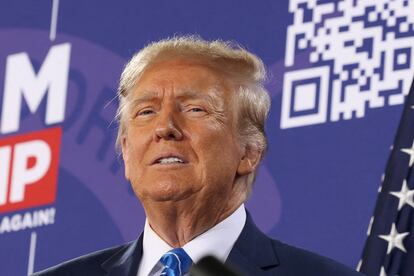Trump stays on Illinois’ ballot as election board declines to ban him over insurrection amendment
The U.S. Supreme Court is scheduled next week to hear arguments in Trump’s appeal of a Colorado ruling declaring him ineligible for the presidency in that state

Illinois’ election board on Tuesday kept former President Donald Trump on the state’s primary ballot, a week before the U.S. Supreme Court hears arguments on whether the Republican’s role in the Jan. 6, 2021, attack on the U.S. Capitol disqualifies him from the presidency.
The board’s unanimous ruling comes after its hearing officer, a retired judge and Republican, found that a “preponderance of the evidence” shows Trump is ineligible to run for president because he violated a constitutional ban on those who “engaged in insurrection” from holding office. But the hearing officer recommended the board let the courts make the ultimate decision.
The board, composed of four Democrats and four Republicans, agreed with a recommendation from its lawyer to let Trump remain on the ballot by determining it didn’t have the authority to determine whether he violated the constitution.
“This Republican believes there was an insurrection on Jan. 6,” said board member Catherine McCrory before her vote, adding that she didn’t believe the agency had the legal authority to enforce that conclusion.
Trump’s attorney urged the board not to get involved, contending the former president never engaged in insurrection but that wasn’t something it could determine. “We would recommend and urge the board to not wade into this,” attorney Adam Merrill said.
An attorney for the voters who objected to Trump’s presence on the ballot said they’d appeal to state court. “What’s happened here is an avoidance of a hot potato issue,” attorney Matthew Piers told reporters after the hearing. “I get the desire to do it, but the law doesn’t allow you to duck.”
The issue will likely be decided at a higher court, with the U.S. Supreme Court scheduled next week to hear arguments in Trump’s appeal of a Colorado ruling declaring him ineligible for the presidency in that state.
The nation’s highest court has never ruled on a case involving Section 3 of the 14th Amendment, which was adopted in 1868 to prevent former confederates from returning to office after the Civil War but has rarely been used since then. Some legal scholars say the post-Civil War clause applies to Trump for his role in trying to overturn the 2020 presidential election and encouraging his backers to storm the U.S. Capitol after he lost to Democrat Joe Biden.
Dozens of cases have been filed around the country seeking to bar Trump from the presidency under Section 3. The Colorado case is the only one that succeeded in court.
Maine’s Democratic Secretary of State also ruled that Trump violated the 14th Amendment and is no longer eligible for the White House, but her ruling is on hold until the Supreme Court issues a decision.
Sign up for our weekly newsletter to get more English-language news coverage from EL PAÍS USA Edition
Tu suscripción se está usando en otro dispositivo
¿Quieres añadir otro usuario a tu suscripción?
Si continúas leyendo en este dispositivo, no se podrá leer en el otro.
FlechaTu suscripción se está usando en otro dispositivo y solo puedes acceder a EL PAÍS desde un dispositivo a la vez.
Si quieres compartir tu cuenta, cambia tu suscripción a la modalidad Premium, así podrás añadir otro usuario. Cada uno accederá con su propia cuenta de email, lo que os permitirá personalizar vuestra experiencia en EL PAÍS.
¿Tienes una suscripción de empresa? Accede aquí para contratar más cuentas.
En el caso de no saber quién está usando tu cuenta, te recomendamos cambiar tu contraseña aquí.
Si decides continuar compartiendo tu cuenta, este mensaje se mostrará en tu dispositivo y en el de la otra persona que está usando tu cuenta de forma indefinida, afectando a tu experiencia de lectura. Puedes consultar aquí los términos y condiciones de la suscripción digital.








































